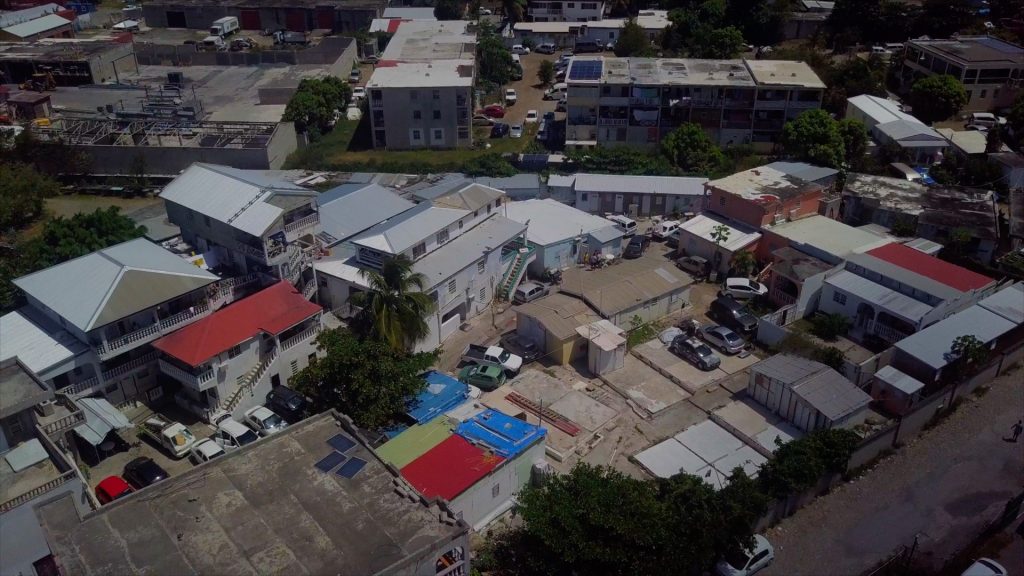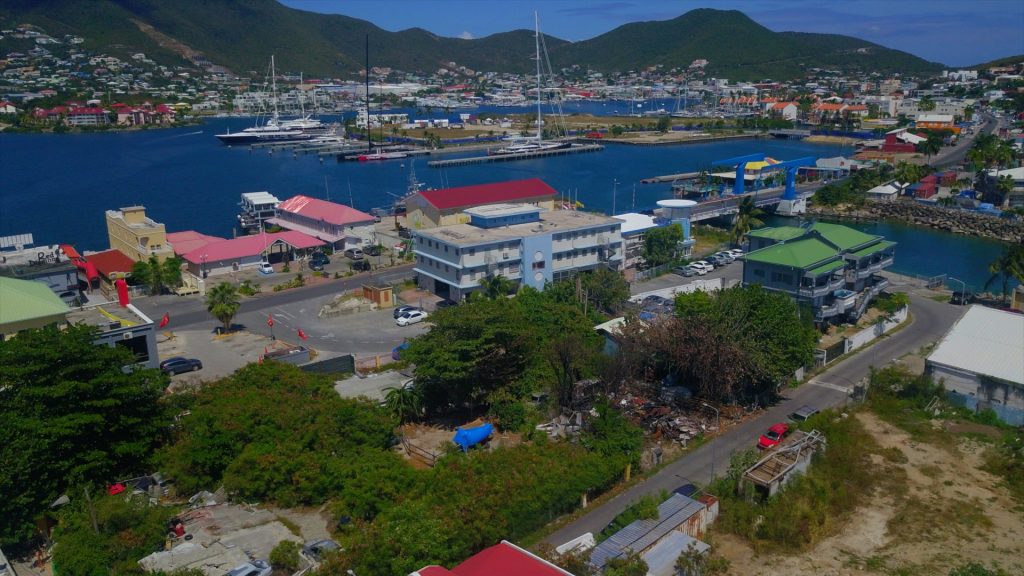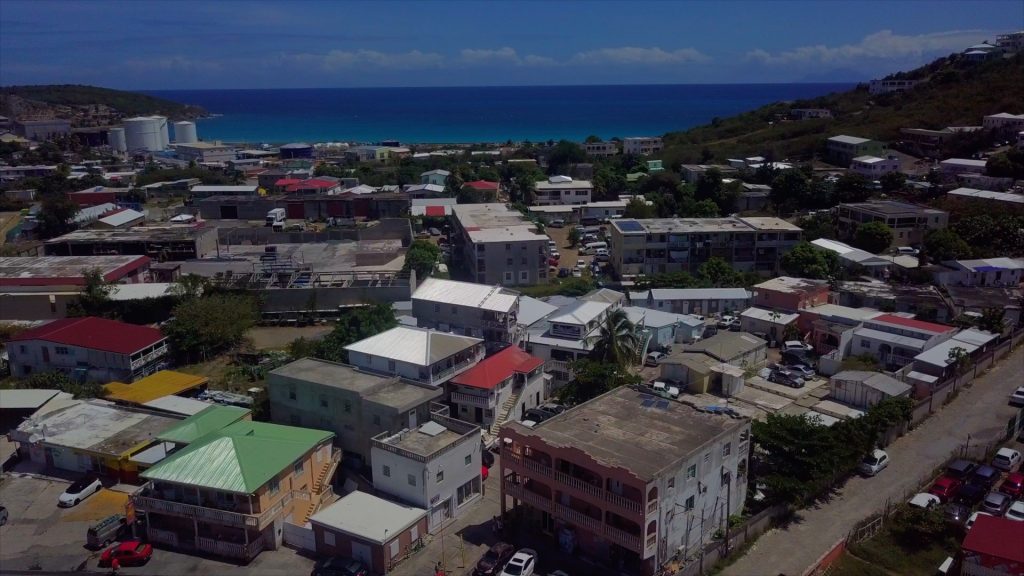Patios in trouble; MP Buncamper wants cleanup
PHILIPSBURG — A few hundred meters away from the Government Building on Pond Island, on government land next to the dump, a human drama unfolds. Residents are starving, and some had no running water or electricity for more than a week. Illegal construction work resumed last week in St. Maarten, but by no means, can all undocumented immigrants get back to work and make a living.
Pond Island is home to hundreds of people, many of whom reside illegally on the island. The shantytowns between the government building and the dump are ruled by Dominicans, and they form the majority. Close to the street next to Telem and Turning Point Foundation, a Jamaican community lives and further, at the foot of the dump, near the site for inspection of public transport motor vehicles, a mix of Venezuelans, Colombians and Haitians. They live in shacks that were once built by Dominicans.
Residences of illegal immigrants on St. Maarten are known as patios, usually named after the “owner”. Patio de Yanira near the dump is hidden behind mountains of scrap iron but is known to the police. “The police know exactly who we are and where we live,” says a Venezuelan tenant. “Shortly after the lockdown, we were playing dominoes here on the sandy path. The police came to us. One of them kicked over the domino table and said, “Go home, you guys!” He pointed in the direction of the patio.”
The patio is full of mosquitoes. There are ten units, shacks built with wood, plywood, corrugated metal and other construction debris. Each unit has a sink, refrigerator, toilet and shower. The spaces are small, just big enough for two beds. There is no other furniture. Each unit is rented out for $275, or $300 if two persons share the space. Inside it is musty; the residents often gather outside. Fifteen men, and a woman who cooks food that is shared among the group.
On May 13, the entire patio de Yanira was cut off from electricity, the men say. “This was ordered by Yanira, who lives in the Dominican Republic. She had not received the rent for April from everyone. We wouldn’t get access to electricity again until all tenants had paid.” The water was also turned off the next day.
Refrigerators stopped working and food got spoiled. A bad smell came from the toilets. “It is horrible. We can’t get water anywhere. Dominicans in the area refuse to help us,” the group wrote in an app a few days ago. “Please help.”
A day later, electricity was reconnected. Some of the men had returned to work at the beginning of the week as the government allows construction work again. The water supply remained cut off: a remainder of $200 had to be paid. Since yesterday there is water coming out of the tap again.
The residents were relieved, but now fear that the situation will repeat itself early next month. Some of the men have no work, no income, and there is not enough food for everyone. “If we don’t pay the rent on time, electricity and water will be cut off again, we were told.”
The patio on the dump is one of many. In several places on the island, there are communities of undocumented migrants. On some sites, people sleep under plastic sheeting, in other locations multiple people share a house or apartment. Downtown Philipsburg is home to a large number of illegal immigrants. In parts of Backstreet Spanish is the most widely spoken language, typically places where people live in poor conditions.
Patio de Andrew in Cay Bay houses more than a hundred immigrants, mostly men. Not visible from the road, there are a large number of one-bedroom apartments in two- or three-story buildings. Over time, more and more buildings and rooms have been added. Before the lockdown, most residents worked on-demand in the construction industry. In recent weeks, people on the patio have been starving and received aid from private organizations. Since construction work on the island has resumed, residents leave their homes early in the morning to go to work and earn the overdue rent.
According to Member of Parliament Claudius Buncamper (USP), formerly Department Head of Infrastructure at VROMI, St. Maarten is guilty of creating the underground economy. “We rent places to the illegals, we give the illegals jobs and pay them less. That is us doing that.” In his weekly update via Facebook Live, Buncamper says he is in favor of a massive cleanup. “I believe that in the next year to two our tax structure, our tax system should have been changed, and put in place the right way. The way that we have point of sales in every business so that the country can really see what is happening. We should clean up the gray economy. And we should thank all the undocumented people living here and send them back.”
MP Buncamper counts on help from the Netherlands. “I know that the Dutch are in charge of border control. So I hope the Dutch can take all those militaries that they got down in Divi Little Bay there, where they closed off half the beach and said they don’t want to see no people there, and maybe they help us in collaboration with the justice minister to clean up the undocumented on this island. And when the borders open up, if they bring back the Karel Doorman, load up everybody, and make a spin through the Caribbean and drop them all off. Voila!” Forcefully: “We have to do it. If we don’t, we have a problem.”
One of the men in Patio de Yanira asks to send him the link to Buncamper’s Facebook Live. “We knew nothing about this.” He says he doesn’t understand. “Why would he want us off the island when we are the ‘mano de obra’?” According to the men, their employers are ‘very happy’ with them. “We do a good job and work longer, more hours.” At a time when things are going bad economically, there is a greater need for skilled workers who do fast and good work for little money, according to the illegal workers. “If we are not here, who will finish the buildings?”
###
Related links:
MP Buncamper’s weekly update via Facebook Live
St. Maarten informal economy grounded to a halt
Venezuelans in St. Maarten are hoping for quick repatriation

























